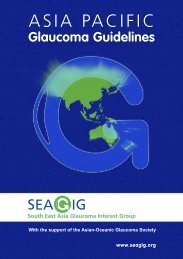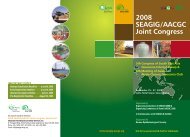NHMRC Glaucoma Guidelines - ANZGIG
NHMRC Glaucoma Guidelines - ANZGIG
NHMRC Glaucoma Guidelines - ANZGIG
You also want an ePaper? Increase the reach of your titles
YUMPU automatically turns print PDFs into web optimized ePapers that Google loves.
<strong>NHMRC</strong> GUIDELINES FOR THE SCREENING, PROGNOSIS, DIAGNOSIS, MANAGEMENT AND PREVENTION OF GLAUCOMA<br />
Chapter 7 – Diagnosis of glaucoma<br />
Risk factors<br />
This section summarises the risk factors that should be assessed in a medical history.<br />
Major<br />
• advancing age (exponential)<br />
• increasing IOP (exponential)<br />
• African-derived (POAG) or Asian-derived (PACG) ethnicity<br />
• strong family history<br />
• diabetes<br />
Minor<br />
• rural lifestyle<br />
• migraine and peripheral vasospasm (Raynaud’s syndrome)<br />
• long-term steroid use<br />
• previous eye injury<br />
• current cigarette smoking<br />
Comorbid conditions<br />
• respiratory<br />
• cardiovascular disorders<br />
• endocrine disorders (e.g. diabetes, thyroid eye disease, pituitary tumours)<br />
• central nervous system (e.g. stroke/head injury, early dementia)<br />
• psychiatric (e.g. depression)<br />
• musculoskeletal conditions which may alter capacity to self-medicate<br />
• renal and hepatic disorders<br />
• ocular trauma or concurrent ocular conditions (e.g. cataract)<br />
• pregnancy or lactation<br />
For further details refer to Chapter 6.<br />
Evidence Statements<br />
• Evidence strongly supports taking a comprehensive history including identification of ocular signs and<br />
symptoms, risk factors, relevant comorbid conditions and concurrent medication, to diagnose glaucoma.<br />
• Expert/consensus opinion suggests that a comprehensive history is required to identify which<br />
management approach is most likely to be effective. A comprehensive history includes the potential<br />
impact of visual dysfunction, social environment and patient’s support networks that may affect<br />
adherence to medication regimens.<br />
68 National Health and Medical Research Council





